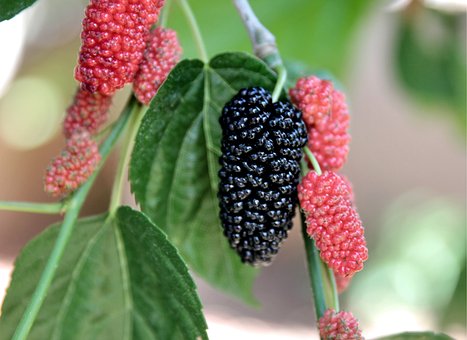What is the first thing that comes to mind when you think of Mulberry? The color or the fruit? The color looks cool, and the fruit tastes even cooler. The mulberry is a traditional summer fruit in India, and has inspired many recipes as well as runway styles.
There are many different colors of mulberry, including white, red, and black. Mulberry is popular all over the world, both as a color and as a fruit. This has also been found in many children’s stories and nursery rhymes. We all grew up jumping to the tunes of “Here we go round the Mulberry bush”.
A perfect summer fruit is something that is sweet, and among the options of watermelon, mangoes, and muskmelon, it is the best option. It is slowly gaining popularity as a ‘functional fruit’.
Although it appears small, mulberry provides many health benefits.
The benefits of drinking green tea include aiding digestion, lowering cholesterol, supporting the immune system, improving vision and blood circulation, and helping to control blood sugar levels. According to some research studies, mulberry fruit benefits also include reducing cancer risk.
Mulberries are a great fruit to pick if you’re looking for something nutritious. It contains a wide array of antioxidants, minerals, vitamins, lipids, protein, dietary fiber, and high water content.
Mulberries are beneficial because they contain vitamins and minerals that are essential to human health.
Riboflavin, a vitamin found in mulberries, helps the body break down carbohydrates, proteins, and fats to produce energy.
The white mulberry is the most commonly used in alternative medicine and traditional Chinese medicine, while red and black mulberries are more popular and common.
Many people advocate for the use of honey as a natural remedy for a number of different disorders, including constipation, colds, coughs, anxiety, high cholesterol, high blood pressure, and diabetes.
The White Mulberry is known for its high anthocyanin content, a plant-based compound with antioxidant properties. Chinese medicine uses Mulberry juice to treat poor blood circulation and anemia.
That’s about White Mulberry. However, red and black are equally delectable and nutritious. Let’s look at some Mulberry fruit benefits.
Mulberry Health Benefits
1. Protects against lead toxicity.
Mulberries are full of antioxidants, which can help protect cells from damage caused by free radicals. Lead is an environmental pollutant that has been red-flagged by scientists.
The concern that natural sources may not be able to protect or cure people from lead exposure is gaining momentum.
The leaves and fruit of the mulberry plant contain a number of active compounds that can be useful in treating cancer. These compounds have antioxidant properties and can help to reduce the growth of tumors. The plant extracts also appeared to protect against lead toxicity, which leads to anemia, metabolic disorder, and tissue damage.
2. Protects the liver.
Some researchers have found that certain compounds in mulberries could have a positive effect on liver health. It is particularly effective in preventing fatty liver disease.
The benefits of mulberry fruit also help to lower triglyceride, cholesterol, and density lipoprotein cholesterol (LDL) levels.
3. Improves vision.
The benefits of mulberry fruit also include improving vision and protecting eyes from free radicals.
The zeaxanthin compound in mulberries is a carotenoid that helps to reduce oxidative stress in the cells that form our eyes. Some people believe that this flower can help to protect the retina from harmful ultraviolet rays and free radicals. These same free radicals are also believed to be responsible for causing cataracts and macular degeneration.
Like carrots, mulberries too are good for your eyes. They improve your vision and prevent eye sight loss that is caused by retinal degeneration.
Antioxidants like zeaxanthin present in mulberries help protect cells, including those in the eyes, against oxidative stress. , two age-related vision problems The carotenoids found in mulberries help to decrease the risk of developing cataracts and macular degeneration, two age-related vision problems.
4. Anti-aging benefits.
Mulberries can help give you a youthful and fresh appearance. The plants contain resveratrol, which is a substance that can protect the skin from harmful UV rays. Mulberries are high in antioxidants, which help to prevent aging.
They keep your skin blooming and free of wrinkles. The antioxidants in mulberries can help to protect your skin from damage caused by free radicals, which can lead to the formation of fine lines. Lack of vitamins A, C and E leads to wrinkles, which mulberries can provide.
Mulberries are rich in antioxidants, which prevent blemishes from forming on the skin. Mulberries have an effect on the melanin synthesis in your skin, which can lead to the lightening of dark spots.
They contain antioxidants that hydrate, unclog pores, and remove impurities from your skin, keeping it healthy and vibrant. Mulberries can help to even out your skin tone and make your skin look naturally beautiful and healthy.
Lack of Vitamins A and E cause dry skin. Mulberries are rich in vitamins that help treat dry and delicate skin. They hydrate your skin from within. Mulberry root extracts soothe irritated skin.
Mulberry contains essential nutrients like Vitamin A, Vitamin C, and Vitamin E. Mulberries help the skin look smooth and minimize age spots.
Assuming you want a summary: Mulberries are good for your skin because they contain minerals that promote elasticity, flexibility, and nourishment.
5. Boosts immunity.
Mulberries contain high levels of Vitamin C, as well as other nutrients that work together to protect the body against illness and infection. It is also full of anti-oxidants.
Mulberries contain an abundance of antioxidants. The fruit contains a high concentration of the powerful antioxidant resveratrol, which is a natural antibiotic and helps in reducing heart risks. It also keeps a check on the blood pressure.
6. Improves digestive health.
Mulberries are a boon for your stomach. Mulberries contain a good amount of dietary fiber. Your body needs dietary fiber to facilitate proper digestion. Fiber supplements are an excellent way to relieve constipation and lose weight.
Fiber makes stool bigger and easier to pass through the digestive system. going through this process can help reduce constipation, bloating, and stomach pain.
Healthy digestion helps in efficiently maintaining optimum weight.
Research was conducted by Italy’s F. The De Ritis Institute and the Catholic University of Sacred Heart are teaming up to study the weight loss capacity of mulberries. It was found that those who consumed mulberries as part of a balanced diet plan of 1300 calories decreased their total body weight by 10% in nearly three months. The researchers also found that the group who ate mulberries saw a significant reduction in waist and thigh size. If you want to have a slender waist and toned thighs, you should know what to eat.
7. Promotes hair growth natural hair color.
The antioxidants present in mulberries help keep your hair healthy by promoting hair growth and preventing breakage.
Mulberries can help prevent early hair graying when used in combination with traditional Chinese herbs. Mulberries contain nutrients that are essential for good health, including calcium, iron, Vitamin C, and B.
8. Builds bones.
Mulberries are rich in nutrients that are beneficial for bone health, including Vitamin K, calcium, and iron. This combination of nutrients helps to maintain strong bones and prevent bone loss. These nutrients in question help to improve the condition of bones that are already degraded, and also prevent illnesses and disorders which target bones, such as osteoporosis and arthritis.
9. Prevent flu and cold.
Flu and cold are a menace. Don’t you agree? Well, eating mulberries could solve that problem for you. The white mulberry fruit has been used as a folk remedy for colds.
The white mulberry is believed to have astringent, bactericidal, and tonic properties and may help to prevent and treat the flu and cold. Vitamin C and flavonoids in lemons also help to prevent cold and flu.
10. Are an anti-inflammatory agent.
Resveratrol present in mulberries have anti-inflammatory properties. Mulberries also contain anthocyanins that help in preventing inflammation. Mulberries can be used as a natural alternative to drugs that reduce inflammation.
11. Improves blood circulation.
Mulberries help improve blood flow and circulation throughout the body, as well as help to control blood pressure levels. They are also known for their blood cleansing properties.
The presence of antioxidants in mulberries help improve blood vessel function by keeping them supple and dilated. This leads to blood pressure control because there is a free flow of blood from the heart to other parts of the body.
Mulberries are effective in encouraging the production of red blood cells as they contain a large amount of iron. Mulberries contain polyphenols that keep the blood vessels healthy. They also contain potassium, which lowers the blood pressure.
Mulberries have been used for centuries as a possible remedy for blood-related health issues. Ancient Chinese medicine used them in their blood tonics to cleanse the blood and increase production.
12. Cure anemia.
Mulberries are beneficial for treating anemia due to their high iron content. They also relieve symptoms of anemia including fatigue and dizziness.
13. Better heart health.
The nutrients in mulberries help support heart health. They help to keep the blood flowing smoothly, which in turn prevents heart attacks and strokes. Mulberries are rich in polyphenols, which are chemicals that are known to have positive effects on heart health.
14. Promote brain health.
Mulberries may help keep the brain young and alert as we age. Calcium is essential for the brain’s health. Mulberries can help prevent Alzheimer’s disease.
Mulberry Consumption Precautions
Eating mulberries in moderation is considered beneficial for health. Mulberries are safe to eat in moderation, but eating too many can lead to a drop in blood sugar levels, which can be dangerous.
People on diabetic medication should eat mulberry with caution as it may affect their blood sugar levels. Mulberry can cause mild diarrhea, dizziness, constipation, and bloating at higher doses.
Mulberry extract is believed to have carcinogenic side effects. Studies have found that these hinder the absorption of carbohydrates and triacylglycerol, which may subsequently increase the risk of hypoglycemia.
The side effects of mulberry in children, pregnant women, and breastfeeding mothers have not been properly established due to a lack of research.
Mulberry Leaf Benefits
1. It is a common ingredient in cosmetics that are used to lighten the skin.
2. Mulberry leaves may help to combat diabetes according to recent research. This is because the leaves contain compounds such as deoxynojirimycin (DNJ) which prevent the absorption of carbohydrates in the gut. The mulberry leaves reduce high levels of insulin, which helps to regulate blood sugar levels.
3. Mulberry leaf contains numerous compounds, including antioxidants, which may help reduce inflammation and oxidative stress, both of which are linked to chronic disease.
4. Mulberry leaves can improve heart health in various ways, such as reducing cholesterol and blood pressure levels, and preventing plaque from building up in arteries and causing heart disease.
5. A recent study has investigated the promising therapeutic benefits of drinking Mulberry leaf tea in reducing cardiometabolic risks. Cardiometabolic risks include glucose intolerance and/or insulin resistance, abdominal obesity, dyslipidemia, and hypertension.
Mulberry Leaf Precautions
Mulberry leaf is generally safe, but it may cause some side effects like headache, fatigue, and nausea in some people. Some people have reported side effects such as nausea, dizziness, bloating, constipation, and diarrhea when taking supplements.
Additionally, people with diabetes who are taking medication should speak to a doctor or dietician before consuming mulberry leaf, as it can impact blood sugar levels. Pregnant women, breastfeeding mothers, and children should avoid it because there is not enough research to show it is safe.









